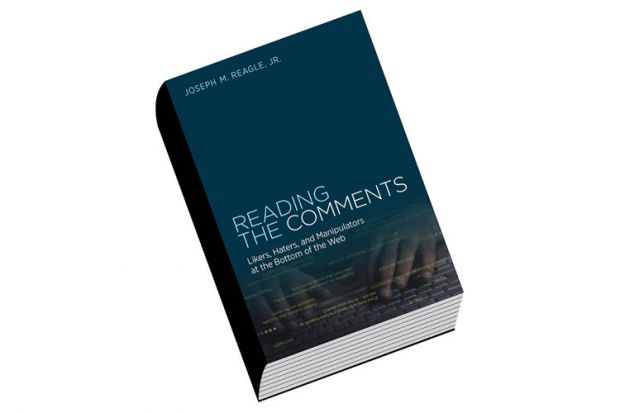The book’s subtitle was tantalising: a researcher/scuba diver fathoms the depths of digitisation. At the web bed lives a world of cutters, eaters, feeders and rubber queens digitally scragging leather queens. Talc and studs fly.
But I was to be disappointed. This book is more Taylor Swift than leather queen.
Some books summon a soundtrack when reading the first few pages. For Joseph Reagle’s Reading the Comments, it was indeed Taylor Swift that accompanied these initial paragraphs. Haters gonna ha-ha-ha-haate. But shakeitorrf. Shakeitorrf.
This book’s focus is a valuable and timely one: the haters, the likers and the puppeteers of the web. But the research is dated: “user-generated content” swims through “Web 2.0” and “the wisdom of crowds”. Sherry Turkle and Howard Rheingold bobble on the waves. The Internet of Things is not mentioned, and the web appears to be disconnected from families, work, education and life.
Reagle believes that “in sifting through the comments, we can learn much about ourselves and the way that other people seek to exploit the value of our social selves”. His monograph deploys just enough US-based cultural studies theory to not appear anti-intellectual and includes sufficient examples to pepper the pages with evidence.
Yes, rudeness, bullying, trolling and ruthlessness are part of comment culture. Yes, comments appear at the bottom of many web pages. However, the key social question about these spatial and metaphysical bottom-feeders is not answered here: why do men and women possess the inclination to attack trivial ideas and people they will never meet?
His book is “about comment in the age of the Web”, Reagle says. His best work appears on page 17, where he begins to develop a morphology of the comment: reactive, short, asynchronous and in a context. That last characteristic has enormous potential for development. Similarly, he makes a key point, again on page 17, that “all forms of writing that have gone before are present on the Web – and at a very large scale”. Extending this single sentence could have initiated a remarkable book, exploring writing modalities in comment culture.
As the reader moves on from page 17, there is discussion of product reviews, Yelp and Amazon ratings, controversies between writers and reviewers on the website Goodreads.com, spam, sock puppets, beta readers of fan fiction and the manipulators of comments for economic gain or personal attack.
However, there is a major problem that cannot be shaken off with Taylor Swift. Theorisations of capitalism and attendant austerity policies, particularly since the global financial crisis, are invisible in this book. For Reagle, comment culture reveals our social selves in a commodified environment of information asymmetry. But there is no questioning of power – rather than information – asymmetry.
The book’s eight chapters have value in building the link between the commodified self and “quantified relations” with digitised information and people. But instead of asking the difficult question about the ruthlessness and cruelty of screen behaviour, Reagle argues that “we need to find ways to develop a robust self-esteem that can handle ubiquitous comment”. This is a cultural studies version of the bumper sticker “Toughen up, Princess”. In this internet age, do we need tougher self-esteem, or are we better served by questioning the expertise of those who comment?
“We live in a world in which everything can be commented on,” says Reagle. That includes end of semester reviews of academic teaching, and book reviews such as this. But we need more from university academics and publishers. Be courageous. Do not assume that if the topic involves the internet, then it must be cutting edge and innovative. Do not assume that a lack of theoretical engagement can be masked by quirky examples. Do not justify cruelty because it exists. Most importantly, do not confuse shopping with thinking.
Tara Brabazon is professor of education and head of the School of Teacher Education, Charles Sturt University, Australia. She is author, most recently, of Enabling Universities: Impairment, (Dis)ability and Social Justice (2015).
Reading the Comments: Likers, Haters, and Manipulators at the Bottom of the Web
By Joseph M. Reagle Jr
MIT Press, 240pp, £19.95
ISBN 9780262028936 and 2328869 (e-book)
Published 26 June 2015
POSTSCRIPT:
Print headline: The net is dark and full of terrors
Register to continue
Why register?
- Registration is free and only takes a moment
- Once registered, you can read 3 articles a month
- Sign up for our newsletter
Subscribe
Or subscribe for unlimited access to:
- Unlimited access to news, views, insights & reviews
- Digital editions
- Digital access to THE’s university and college rankings analysis
Already registered or a current subscriber? Login




